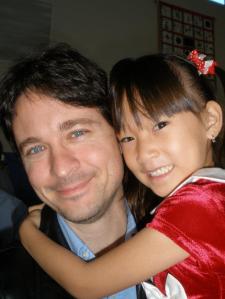
Malik B.
asked • 11/13/12In regards to the big bang heory, where did the matter come from to have the big bang?
I believe in the creationist theory, my question is posed toward darwinist...
6 Answers By Expert Tutors

Michael B. answered • 11/13/12
I can provide your 'A-HA' moment
The Big Bang theory posits that matter (and anti-matter) were both created as part of the Big Bang. In other words, matter didn't cause the big bang, matter was produced BY the big bang. This is a result of the equivalence of matter and energy (Albert Einstein's E=mc2).
However, you also seem to be asking about Darwinism, which has absolutely nothing to do with the Big Bang theory. Darwinism is an explanation for life on planet Earth, and Big Bang is an explanation for the existence of the universe as a whole - two very fundamentally different questions.
Malik B.
Duh, I know what Darwinism is, the opposite of Intelligent Design, I was just juxtaposing for clarity purposes...I thought the Big Bang Theory was the explosion of matter creating the planets...How do you get an explosion if there's no matter to explode?...
11/13/12

Michael B.
It is a common misconception that the Big Bang theory suggests an "explosion" of the sort you are referring to. The explosion you are referring to is a chemical reaction, which is exactly NOT the type suggested by the Big Bang Theory. Instead, the Big Bang Theory suggests an "explosion" (for lack of any better word) of space itself. That is, space is what is exploding, not the matter in it, and in this case "exploding" does NOT mean "blowing up into tiny bits" it means a "massive expansion".
Think of it like a bubble growing in a pot of boiling water... There was no bubble there to start with, but the bubble expands nonetheless. This is obviously a very weak metaphor that doesn't truly correlate to Big Bang spatial expansion, but it might give you the basic concept.
11/13/12
Malik B.
The bubble example, was I know an over simplification, but effective to a laymen to a degree...You sound like you are a Darwinist, and you are dissuading me from my Creationist belief, because I thought as I stated, that matter was a part of the Big Bang theory...Big Bang is an misleading an ambiguous name for what occurred...Thanks for your clarification...
11/13/12

Michael B.
You aren't the only one to think that "Big Bang" is a misleading and ambiguous name... some very top-tier physicists think the same. Unfortunately, it is the name it was given when first proposed, and the public has latched on to it. To change it now would probably cause a lot of confusion.
Also, although I do believe in Darwinism, as there is overwhelming evidence supporting this theory, I'm certainly not trying to dissuade anyone from their own beliefs; I'm simply answering the question. :)
11/14/12

Chase M.
As my understanding of the Big Bang goes, it is sort of a yo-yo effect. The universe goes out, after the Big Bang, slows down, then comes back to the singularity, then we have another Big Bang, all taking billions, if not trillions of years to complete one cycle. This just happens over and over again.
Unforutunately due to our short lifespans, and lack of knowledge, this cannot be proven, as of yet. For all we know, this may not be the case, there may be mulitple universes in which this is happening simultaneously, or even this may be happening at distant parts of our own universe..
11/14/12

Michael B.
Chase - you are referring to the "cyclical universe model". That certainly is one of the theories that has been proposed, but there are MANY theories. The "standard big bang theory" does not include this concept, however.
11/15/12

Mark D.
The long story short is we don't know yet. What we do observe in the most distant places our telescopes can see is a very hot and dense soup of particles. This soup seems to originate in an even hotter and denser ball of matter that as many models suggest was something called a "singularity." The stuff that made up this really hot and dense matter can be made to come into existence in very small amounts by smacking atoms and part of atoms together at very high speeds. These particle have different properties than the particles that make up most of what the universe as we see it now. The biggest difference being that most of them have more "mass" than their "normal" matter counterparts. Einstein actually published E=mc2 as m=E/c2. The amount of mass is proportional to the Energy in a unit called "Joules" divided by the speed of light squared. What makes the Sun shine is a very small amount of matter being released as mostly very high energy light as four atoms of hydrogen are converted into a single atom of helium.10/05/19
Brian P.
First week of high school freshman algebra class made it clear you cannot have an equation where zero equals something. Scientific community has to admit they cannot proove IN THE LABORATORY how the universe began. Something has to be eternal. It does not demean science to admit you do not know. Stop making up silly nonsensical terms like singularity. Much much more transparency is needed in the public schools in particluar to emphasize that science does not know the answer.12/19/21
Jose C.
You are cookin, bro. You r absolutely correct. Science proves God is. He must exist. Nothingness cannot create something. It is impossible, It has never happened, ever. It cannot happen, yet, here we are. There is only one solution. God, who is infinite, all-powerful, eternal, has always been and will always be, by definition, must have created the universe.03/16/22
Rebecca M.
I personally believe that God created the Universe and science has figured out part of how God began creation. I don't believe physicists will ever find all the answers that only God knows. I definitely don't believe in Darwinism. If we evolved then why aren't we still evolving? Other animals do not seem to be evolving. Apes are still apes and not evolving into humans. If we evolved from great apes then there should be no apes only humans.05/12/22
Jim W.
Amen to you Reb M. Only a fool will say in his heart there is no God. Something was created from nothing, absolutely nothing?? And there was and is the Eternal God.06/13/23
Alan R.
You Bible thumpers crack me up.. so where did your God come from? Who created him? You can’t go from having nothing to suddenly having something. Oh wait, that rule only applies to science, not faith based beliefs, which lack any evidence, at all, for anything, aside from a book that has been rewritten and edited over the centuries to fit the narrative your religion wants you to believe. And there is no proof that the Bible is any more truthful than homer’s Iliad. Everyone is entitled to their own beliefs and faiths, but to insist you are correct and everyone else is a moron for using their actual brain to try to assess where we may have come from, is just ignorant. In either scenario you get something from nothing, both the Big Bang and creation. That doesn’t prove that your faith based beliefs are fact, nor does it make the Big Bang a fact, that is why it is called a theory, not the Big Bang fact. As far as animals and evolution, read a book, they can be very enlightening. There is the animal called a frog… funny thing is it starts out a a tiny tadpole and grows legs and loses its tail as it grows. You can’t literally catch them and watch them evolve over time, also information found in a science book.08/14/23

Stanton D. answered • 04/21/15
Tutor to Pique Your Sciences Interest
Raymond B. answered • 02/18/22
Math, microeconomics or criminal justice
Creation ex nihilo is the Genesis story. There was nothing, then God created Creation out of nothing.
Darwinists have a major problem explaining how nothing "evolved" into something. But then they have the same problem showing how non-life could evolve into life.
Stephen Hawking (Prof. Sheldon Cooper's big hero) the major physicist of our time, at least resorts to "imaginary time" that existed before the singularity. That's really it. An "imaginary" past explains real existence. Same with other physicists who argue for multiple universes. They claim these other material universes caused the Big Bang, some sort of collision among other universes. But again, this requires belief in other universes for which we have no evidence and will never observe, which seems to be the direct opposite of science and the scientific method. They are in effect "imaginary" universes. You have to believe in "imaginary" time or "imaginary" places to believe in the Big Bang theory.
Read Schoeder's book The Science of God. He's a Jewish MIT Israeli physicist who correlates the 7 days of Genesis with the time scale of the Big Bang, using Einstein's relativity, so that a day of Genesis converts to billions of years, depending on your location in the universe.
Another theory is the "steady state" theory, promoted by Sir Fred Holyle. He almost got a Nobel Prize for it, but then he and Chandra Wickramasinghe wrote a book questioning Darwinian evolution, and biologists complained that a non-Darwinist was not scientific enough to receive a science Nobel. Holye and Wickramasinghe, an atheist Buddhist, argued for Crick's theory (a Nobel laureate for DNA) that life evolved elsewhere in the universe and was seeded from outer space on earth, as there is insufficient time for life to have evolved on earth. That was Lord Kelvin's response to Darwin, in Darwin's time, that there was insufficient time for evolution on earth. Kelvin wasn't particularly religious or a Creationist, but was a major physicist giving us the laws of thermodynamics. The 2nd law of thermodynamics opposes evolution, as it says everything is subject to entropy and decay, with no upward evolution to higher ordered organisms.
The "Big Rip" also opposes evolution, as the universe is getting increasingly spread out, without the means to go into a steady state collapse back to a Dark Black Hole. Think of the Big Bang as the hugest Black Hole which doesn't allow even light to escape. Then it's impossible it could have "exploded" Also that Big Bang initial explosion involves an expansion of the universe with speeds faster than the speed of light, which according to Einstein is impossible. time slows down to nearly zero as speed approaches the speed of light. When it exceeds the speed of light, time goes backwards, but at the Big Bang there is no backwards in time to go. The Big Bang theory is inherently contradictory, contradicting all known science, in every way.
Nonetheless some christians have adopted the Big Bang as supporting Genesis as it does give a Beginning like the first words of Genesis. That's precisely why the atheist scientists resisted the Big Bang theory initially, as it seemed to support Genesis, but their own contradictory "science" led inexorably to the Big Bang and they finally accepted it, but strongly pointing out it was billions of years ago, not 7 days like Genesis.

Max L. answered • 11/29/12
Patient and Experienced with teaching and tutoring children.
42.

Mark I.
Nice! Max L. LOL03/26/20
Roman C. answered • 11/16/12
Masters of Education Graduate with Mathematics Expertise
Nobody knows for certain what could cause the big bang. However, there are two theories that scientists developed in the late 20th to beginning of the 21st century. They are String Theory and M theory. The M stands for Membrane.
String Theory posits that what we call particles/antiparticles are just vibrating strings in extra dimensions other than the familiar space-time. M-theory posits that our universe is sitting in a 3-D membrane (one of many parallel membranes) embedded in a higher dimentional space. Particles are still strings but have endpoints that must be on the membrane. Adjacent membranes are are a microscopic distance apart and all membranes constantly warp ever so slightly. If two membranes collide, a Big Bang occurs giving birth to two universes, one in each membrane.
Just imagine if the two formed universes differ by only there being an antiparticle in one universe for each corresponding particle in the other and vice versa, but with no difference with the relative motion/interaction of the contents. Then it would mean we have a twin universe where there is an anti-earth with an anti-you and an anti-me on it living the same lives as we do here.
Linus C.
After some thinking on this, I think I've grasped the concept of it. However, could you explain the formation of the universe? To comprehend this theory in my mind, I scaled each dimension back by 3. So the universe, instead of being 3D, would be 0D. So when each membrane hits the other, a 0D point without any length width, or height is formed. All strings, which in this interpretation would be 1D, passing through this point would be cut off and be their separate 0D particles. If I'm right about how I interpreted this theory, how do those 0D segments of those 2D strings expand and create matter? Also, if in the same way, only 1 infinitely small piece of a 1D object (a line) can fit within a 0D point, does that mean that only one infinitely small piece of a 4D object can fit within in a 3D universe? P.S. If I need to elaborate or explain something that I said, I can. Just tell me.01/21/22
Referring to michael s answer of yesterday - Where did the matter did not explode come from??

Michael B.
Dave,
Not being a physicist, I'm not sure I can give an accurate answer, but I can tell you about some of the things that I have read in the past.
I believe that the most common answer is that there wasn't matter, but there WAS a LOT of energy. Because of Einstein's E=mc2 equation, we know that matter and energy are really just two forms of the same thing (in much the same way that ice and steam are both two forms of water). A portion of that initial energy ("the steam") condensed into a more compact form ("the ice") that we call matter.
So the next logical question is... where did all of the energy come from? I don't think there is an accepted answer to this yet, but there are several theories. One theory called derives from "M-theory" which is an extension on top of string theory. This theory says that our universe "lives in" or "lives on" or "is" (I'm not sure which is more accurate) a "brane" which itself exists within a larger "existence" of branes, and they are "floating around" in some sense. The theory I'm thinking of says that somehow, two of these branes collided. Think what happens when two things collide in our universe - lot's of energy, right? Well just imagine these two "bigger than the universe" things colliding - this could produce an "extreme" amount of energy which, this theory says, was the seed for all of the energy that we have in our universe today.
If this seems like too much energy to be possible, then step outside your little box and look at the bigger picture... We don't know how big the universe is. It only takes a little bit of imagination to realize that there could be a "universe of universes" and we would have very little way of knowing about it. Our "tiny" universe is all we know. We are like little tiny algae in a very big ocean - do you think the algae, if they could think, would ever know anything about us?
11/15/12

DAVE E.
so where did those things that collided come from???
11/15/12

Michael B.
Dave,
Answer 1: I don't know, and I don't think anyone currently has any good theories about it, but I could be and likely am wrong.
Answer 2: It sounds like you are trying to drag me into a theological argument about the existence of God. (Your line of questioning is the same one everyone uses when doing this... Q: where did X come from? A: Well, it came from Y. Q: Oh yeah - then where did Y come from?... ad nauseam.) Please don't. I'm not arguing religion here, simply providing the scientific view, and probably not even a very accurate one of those.
11/16/12

DAVE E.
Michael my question as to where did the original matter come from has nothing to do with religion.. If we don t know where the matter originated how do we know it existed?? But it does raise the question regarding the existence of a creator.
11/17/12

Michael B.
We DON'T know that it existed. At this time, it is a very speculative theory.
11/17/12

DAVE E.
Sounds like you are saying we just don t know where the matter came from that exploded and became the universe or universes
11/18/12

Daniel O.
That's about right, Dave - we don't know exactly where the energy came from. We really don't know much about what existed (or didn't exist) before the big bang, other than speculative theories.
There are some things that current physics just can not explain, like what goes on inside the event horizon of a black hole, or events prior to the big bang.
11/18/12

Harry D.
10/04/13
El W.
God created the universe! "In the beginning, God created the heavens and earth. And the earth was without form and void, and darkness was upon the face of the deep. And the Spirit of God moved upon the face of the waters. ... And God said, Let there be a firmament in the midst of the waters, and let it divide the waters from the waters." The Big Bang theory is just a way for scientists to avoid the truth about what really happened. You guys may all be tutors and A+ students, but you aren't when it comes to this topic, because if you really were an expert, you would know that God made the universe and everything in it and made man in His own image.12/17/21
Still looking for help? Get the right answer, fast.
Get a free answer to a quick problem.
Most questions answered within 4 hours.
OR
Choose an expert and meet online. No packages or subscriptions, pay only for the time you need.






Mark I.
Nice question Malik!!! This has generated lively and passionate debate and for good reasons. When you say "Darwinist" that typically and very commonly means naturalist or atheist. I will return to that point in a second. I think the key point here in this forum is that the Big Bang is not a scientific question. Allow me to explain because all equation break-down at the moment of the Big Bang we arrive at a singularity. A singularity is where all the laws of physics and chemistry break down. Therefore, is it beyond the domain of science. Science, by definition, cannot explore it. What bothers me here and elsewhere is that intelligent people make wild statements: like the Big Bang caused itself. The Big Bang is the name of the event. For example, a car accident occurs. What caused the accident? It would be absurd to say the car accident caused the car accident. Moreover, when scientists say 'we don't know' they mean in terms of science, which is impotent in this area and some of the most important aspects of lives. Science can say nothing about morality/ethics, logic and reason, higher level mathematics, aesthetics, meaning & purpose, or the meaning of semiotics and metaphysics (the reality of the past, other minds, trusting our cognitive faculties, eyewitness testimony). These things cannot be grown in a petry dish, or placed under a microscope or accelerated in the Large Hadron Collider. There is no empirical unit for them like: Newton, m/s^2, kJ, microns and so forth. Moreover, the nature of consciousness, gravity, energy, and dark matter, science doesn't know what they are fundamentally! Moreover. M-theory besides, being a complete mess, and the hypothesis of the multiverse are branches of mathematical metaphysics. As far as 'Darwinism' there was a book published, I believe in the mid-80's called "Darwin's Forgotten Defenders." Moreover, one of the greatest Modern Synthetic Neo-Darwinistic scientists is Dr. Francisco Ayala of UCI who is a devout Catholic: as is Ken Miller, PhD. And, Dr. Francis Collins former head of the human genome project is an evangelical. More importantly Alfred Russell Wallace was and is the forgotten co-discoverer of macro-evolution and had far more field experience than Darwin and had no racist inclinations. But, he spoke of a supreme and 'over ruling intelligence' much to the chagrin and dismay of Darwin. In transition, much to my astonishment the New Atheist has taken some incredible positions. Several has claimed that the universe created itself or 'nothing' created the universe. Or 'aliens' created us (as far as life goes). These are extraordinary and desperate positions. If you look at the data the chances of life and especially advanced life are effectively '0'. I will add a quote... For example, in order to get life and the right heavy elements there has to be at least 3 generations of stars and the uranium and thorium ratio has to peak and be in the right proportions... But so much for 'following the evidence where it leads' and, or facts and reasons.03/29/20